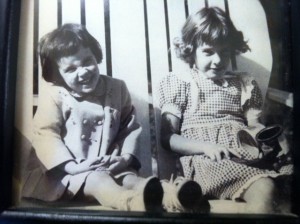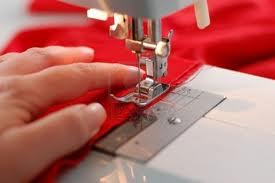 Last Wednesday, I left you in the family waiting room of Munson Hospital while my sister had a very risky back surgery. I’ll bring you up to date. Once the surgeon saw what a mess her back was, he had to fuse four levels of her spine. “I don’t see how she stood the pain,” he said to us afterward. I got to the hospital at 6 a.m. and left at 10:30 p.m. We weren’t allowed to see her for hours after the surgery because they were trying to stabilize her blood pressure. (She no longer has a pituitary to do that work for her.) They pumped her so full of blood, platelets, and fluids to keep her blood pressure up that she looked like the Pillsbury Dough Boy until Saturday, when she began to deflate.She had a bad trip from the heaps of morphine, etc., given her during surgery. She thought she was trapped on a ship, and everyone on board was conspiring to keep us from seeing her. She starts to cry just telling this. She was screaming for me, she says. I’ve always been her big sister. Actually, more of a mother. I both relished and rejected this role when we were young. I ‘d make up elaborate dramas we’d play all day, me always being the boss cowboy, the head of reform school. I was awful. I slammed my door in her face. I held her down and spit on her. I was feeling a weight of responsibility too much for me. But we’re joined at the hip. It’s been so hard to see her suffer these last eight years. No, longer—before they knew what was wrong. Before they found the brain tumor.But her mind’s clearing up. I haven’t seen her eyes so bright in months, since she began taking morphine for the pain. She’s walked—well, kept herself upright with the walker and two helpers—from the bed to the door yesterday. There are four high-heeled shoe-magnets on her bulletin board in her hospital room. She got to move all four yesterday to the “done” category. Four times out of bed.She’s sitting in a chair several times a day. Oddly, she can’t remember how much pain she used to be in. It’s so interesting to me, how the brain decides not to take full account of something so awful that registering its full impact would be crushing. I wonder if it’s a little like the slow-motion action when you know you’re about to crash into another car. Everything is as if it’s happening in another universe.This is my third blog post with my sister taking center stage. I think about how I’m using her pain to power my writing. Sunday evening in my meditation group we were discussing the book we’re reading, talking about how we appropriate things—consume everything in sight in our desire to fill ourselves up, to make ourselves “bigger.” We eat up our world: we paint it, we write it, we photograph it. I’ve appropriated my sister’s pain. Well, my life is material. No apologies. It just is. Do you think Jeanette Walls is apologetic for writing her life? Frank McCourt? Barack Obama? Booker T. Washington? Helen Keller? Or, as poetry: Sylvia Plath, Philip Levine, Sharon Olds, Rita Dove, Walt Whitman—there is no end of poets I could put here.
Last Wednesday, I left you in the family waiting room of Munson Hospital while my sister had a very risky back surgery. I’ll bring you up to date. Once the surgeon saw what a mess her back was, he had to fuse four levels of her spine. “I don’t see how she stood the pain,” he said to us afterward. I got to the hospital at 6 a.m. and left at 10:30 p.m. We weren’t allowed to see her for hours after the surgery because they were trying to stabilize her blood pressure. (She no longer has a pituitary to do that work for her.) They pumped her so full of blood, platelets, and fluids to keep her blood pressure up that she looked like the Pillsbury Dough Boy until Saturday, when she began to deflate.She had a bad trip from the heaps of morphine, etc., given her during surgery. She thought she was trapped on a ship, and everyone on board was conspiring to keep us from seeing her. She starts to cry just telling this. She was screaming for me, she says. I’ve always been her big sister. Actually, more of a mother. I both relished and rejected this role when we were young. I ‘d make up elaborate dramas we’d play all day, me always being the boss cowboy, the head of reform school. I was awful. I slammed my door in her face. I held her down and spit on her. I was feeling a weight of responsibility too much for me. But we’re joined at the hip. It’s been so hard to see her suffer these last eight years. No, longer—before they knew what was wrong. Before they found the brain tumor.But her mind’s clearing up. I haven’t seen her eyes so bright in months, since she began taking morphine for the pain. She’s walked—well, kept herself upright with the walker and two helpers—from the bed to the door yesterday. There are four high-heeled shoe-magnets on her bulletin board in her hospital room. She got to move all four yesterday to the “done” category. Four times out of bed.She’s sitting in a chair several times a day. Oddly, she can’t remember how much pain she used to be in. It’s so interesting to me, how the brain decides not to take full account of something so awful that registering its full impact would be crushing. I wonder if it’s a little like the slow-motion action when you know you’re about to crash into another car. Everything is as if it’s happening in another universe.This is my third blog post with my sister taking center stage. I think about how I’m using her pain to power my writing. Sunday evening in my meditation group we were discussing the book we’re reading, talking about how we appropriate things—consume everything in sight in our desire to fill ourselves up, to make ourselves “bigger.” We eat up our world: we paint it, we write it, we photograph it. I’ve appropriated my sister’s pain. Well, my life is material. No apologies. It just is. Do you think Jeanette Walls is apologetic for writing her life? Frank McCourt? Barack Obama? Booker T. Washington? Helen Keller? Or, as poetry: Sylvia Plath, Philip Levine, Sharon Olds, Rita Dove, Walt Whitman—there is no end of poets I could put here. What seems crucial to me is that there remain a gap between ourselves and our material. We sometimes call it aesthetic distance, sometimes just art. Wordsworth called it “recollection in tranquility.” It may not be exactly that, but whatever our material is, art comes from simultaneously seeing it fully and avoiding clinging to it. As writers, the idea seems to be to avoid absorbing our material as our “self.” It’s simply our material. We may be passionately attached to the situation, the people involved, our own stake in that—but as writers, we see it as the cloth from which we cut and sew a new garment. We don’t know what it will look like until it’s done. We don’t know how it will be worn, where it will go. We only know the cloth it’s made of.I don’t know why I thought of Rilke, here, but I did. And then this poem, this assertion that we must practice our powers, but that the achievement is “purely granted.” And then the last stanza, the requirement that if we ever want the god in us to know itself (I changed the pronoun.) we must span all the contradictions. (I note well that the line doesn't say that WE will know the god in ourselves. Very important difference.) As Once the Winged Energy of DelightAs once the winged energy of delightcarried you over childhood's dark abysses,now beyond your own life build the greatarch of unimagined bridges.Wonders happen if we can succeedin passing through the harshest danger;but only in a bright and purely grantedachievement can we realize the wonder.To work with Things in the indescribablerelationship is not too hard for us;the pattern grows more intricate and subtle,and being swept along is not enough.Take your practiced powers and stretch them outuntil they span the chasm between twocontradictions...For the godwants to know himself in you.--Rainer Maria Rilke
What seems crucial to me is that there remain a gap between ourselves and our material. We sometimes call it aesthetic distance, sometimes just art. Wordsworth called it “recollection in tranquility.” It may not be exactly that, but whatever our material is, art comes from simultaneously seeing it fully and avoiding clinging to it. As writers, the idea seems to be to avoid absorbing our material as our “self.” It’s simply our material. We may be passionately attached to the situation, the people involved, our own stake in that—but as writers, we see it as the cloth from which we cut and sew a new garment. We don’t know what it will look like until it’s done. We don’t know how it will be worn, where it will go. We only know the cloth it’s made of.I don’t know why I thought of Rilke, here, but I did. And then this poem, this assertion that we must practice our powers, but that the achievement is “purely granted.” And then the last stanza, the requirement that if we ever want the god in us to know itself (I changed the pronoun.) we must span all the contradictions. (I note well that the line doesn't say that WE will know the god in ourselves. Very important difference.) As Once the Winged Energy of DelightAs once the winged energy of delightcarried you over childhood's dark abysses,now beyond your own life build the greatarch of unimagined bridges.Wonders happen if we can succeedin passing through the harshest danger;but only in a bright and purely grantedachievement can we realize the wonder.To work with Things in the indescribablerelationship is not too hard for us;the pattern grows more intricate and subtle,and being swept along is not enough.Take your practiced powers and stretch them outuntil they span the chasm between twocontradictions...For the godwants to know himself in you.--Rainer Maria Rilke
Cathedral of the Body, Continued
in Archive
